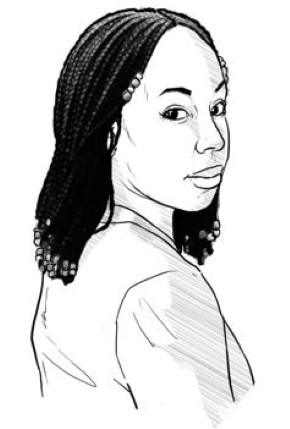
Adichie, Chimamanda Ngozi
Chimamanda Ngozi Adichie was born in Nigeria in 1977. She spent most of her youth in Nsukka, Nigeria. In Nsukka the family lived in the house formerly owned by Chinua Achebe. Adichie cites Achebe as a key influence on her writing, as she read his acclaimed novel Things Fall Apart as a young girl.Adichie grew up in a liberal and intellectual family who allowed her free expression. Adichie’s hometown of Enugu, her adopted town of Nsukka – where she grew up when her father worked at the university – and her ancestral town of Abba would serve as key settings in her debut novel Purple Hibiscus.
Adichie attended medical school in Nigeria for two years before emigrating to the United States in 1997. She changed her academic pathway, completing a BA in Communication and Political Science at Eastern Connecticut State University in 2001.
In 1998, Adichie published her first work in Nigeria, a play, For Love of Biafra. She is critical of her own writing in this work, which explored the 1960s war between Nigeria and the newly separated Biafran Republic. Adichie would return to the Biafran conflict in a series of short stories in 2002 and 2003, one of which was later developed into her prize-winning novel, Half of a Yellow Sun, in 2006.
Adichie graduated with a MFA in Creative Writing from Johns Hopkins University, and went on to gain a further MA degree in African History at Yale. Throughout her university studies, Adichie split her time between America and Nigeria. Many of her stories and her novels are based in Nigeria.
While her own life was not directly affected by the violence of the Biafran conflict and the subsequent coups and civil unrest, Adichie’s values and ideas were shaped by the contradictions of a country beleaguered by periods of tyranny and freedom, order and chaos. Adichie’s writing draws on her academic knowledge of African and Nigerian history, as well as exploring her family’s memories of a Nigeria in crisis.
Adichie’s non-fiction works set out her beliefs about writing, feminism and life experiences. Some have been developed from highly successful TED talks, which drew worldwide acclaim and interest. Her views are not always received without controversy. Her intervention in debates surrounding J K Rowling’s views on gender and identity has attracted criticism.
Adichie’s main interest as a writer was to move away from the idea of a ‘single story’. She had grown up reading Anglo-American literature and struggled to see girls and women like herself in the stories she read. Adichie combined her experience as a History graduate and a feminist when crafting strong female protagonists for her novels. Her non-fiction works present a similar interest in female identity and history and tradition. More recently, Adichie has explored her personal grief and bereavement processes following the death of her father.
Further Reading
© ZigZag Education 2026: content may be used by students for educational use if this page is referenced.
Show / hide details
| 1977 |
Birth
|
|
| 1997 |
Migrated to America for study
|
|
| 1998 |
For Love of Biafra
|
|
| 2001 |
Completed BA degree
|
|
| 2002 |
Becoming a writer
|
|
| 2003 |
Purple Hibiscus
|
|
| 2005 |
International recognition
|
|
| 2005 |
Princeton
|
|
| 2006 |
Half of a Yellow Sun
|
|
| 2007 |
Further success
|
|
| 2008 |
MA in African History
|
|
| 2009 |
‘The Danger of a Single Story’
|
|
| 2009 |
The Thing Around Your Neck
|
|
| 2012 |
Harvard Fellowship
|
|
| 2013 |
Americanah
|
|
| 2014 |
‘We should all be feminists’
|
|
| 2015 |
‘Best of the Best’
|
|
| 2017 |
Dear Ijeawele (A Feminist Manifesto in Fifteen Suggestions)
|
|
| 2021 |
Notes on Grief
|


